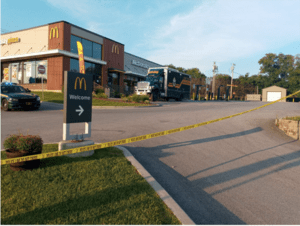By Alan J. Keays/VTDigger
A Rutland City police officer who fatally shot a Florida man in a McDonald’s bathroom after a chase last month told investigators he thought the man was armed.
But he wasn’t.
Police said 33-year-old Jonathan Mansilla had a cellphone in his hand.
Vermont State Police released new details Thursday, Sept. 9, into the shooting by Rutland City Police Cpl. Christopher Rose the afternoon of Aug. 25 inside the McDonald’s on Route 7.

The scene of a fatal shooting at a McDonald’s in Rutland was taped off after it occurred Aug. 25.
Until now, police refused to disclose where inside the restaurant the shooting took place or whether Mansilla was armed. Investigators said they were waiting until they interviewed Rose before releasing that information.
On Wednesday, Sept. 8, Rose provided a “voluntary” interview, according to a Thursday afternoon news release from state police.
Capt. Scott Dunlap, head of the state police’s Major Crime Unit, said later Thursday that the shooting took place in the restaurant’s bathroom and that Mansilla and Rose were the only two people in it at the time.
Mansilla was holding the cellphone up and charging at the officer at the time of the shooting, according to Dunlap.
“They were in close proximity to each other,” he told VTDigger, but he said he wasn’t sure how far apart the two men were when the shooting took place.
Rutland City police officers do not wear body cameras.
Asked if Mansilla said anything to the officer, Dunlap replied, “There was no verbal communication from him.”
As for whether Rose said anything to Mansilla, the captain said, “I don’t think the officer had time.”
Police have previously described events leading up to the shooting. Less than two hours before the shooting, a hit-and-run crash took place in the Goodwill store’s parking lot on North Main Street in Rutland, and Mansilla’s vehicle, a black 2009 Chevrolet Cobalt, was seen fleeing the scene, police said.
Police had spotted the vehicle at various locations, including in nearby Clarendon, before the chase ended when Mansilla’s vehicle crashed into a UPS delivery truck at the intersection of Allen Street and Route 7, locally known as South Main Street.
According to police, Mansilla then darted into the McDonald’s on that corner, and there was an “altercation,” which investigators had not previously described. Rose then shot Mansilla in the chest, killing him.
After conducting interviews and collecting witness statements, including from Rose, state police revealed more information Thursday.
“Rose entered shortly afterward and saw Mansilla’s lower extremities under the gap at the bottom of a stall. Mansilla then exited the stall and ran toward Rose,” the state police news release stated.
“The officer said he observed an object in Mansilla’s hand that he perceived to be an unknown weapon of some kind,” the release stated. “Rose then fired three rounds from his department-issued handgun, striking Mansilla twice in the chest.”
Later, the object Mansilla was carrying was determined to be a cellphone, police said.
The investigation into the shooting is continuing, and the results will be turned over to the Vermont Attorney General’s Office and the Bennington County State’s Attorney’s Office for independent reviews of Rose’s use of deadly force.
Rose is represented through his union, the New England Police Benevolent Association, by attorney Susan Edwards. Edwards could not be reached for comment Thursday.
Jerry O’Neill, a Burlington attorney and former federal prosecutor not connected to the case, said Thursday that it is a “subjective standard” that will play into determining whether the officer acted under the law.
“Did he reasonably believe that he or someone else was in sufficient danger such that deadly force was permitted?” O’Neill asked. “The fact that he’s mistaken about the fact that it wasn’t a firearm — it was a cellphone — it doesn’t mean he was guilty of a crime,” he continued. “The question is whether or not in that circumstance was there enough information available to him that he should have realized it wasn’t a gun.”
O’Neill said it was up to the prosecutors in the attorney general’s office as well as the Bennington County state offices to decide whether a criminal charge is warranted.
“We’re never going to know [what happened] except what he has to say, obviously, that’s the thing that’s going to make a challenge should anyone consider bringing a criminal prosecution,” he said. “There is only one live witness to it.”
David Sleigh, a St. Johnsbury defense attorney also not connected to the case, said Thursday that prosecutors will have to weigh whether the officer’s action was reasonable given the training, experience and the standard of care that a person would expect from an officer in the same or a similar circumstance.
“There’s been a lot of talk around the nation,” Sleigh said, “about raising the bar for when you can use deadly force to instances where it’s all but certain that death or serious bodily injury is imminent to either the officer or somebody else.”




